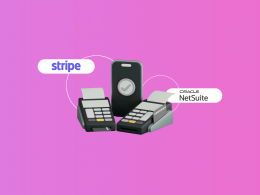Navigating sales tax in ecommerce can often feel like solving a complex puzzle, especially as online operations surge. For any business owner, mastering this facet becomes crucial to ensure both compliance and success in your enterprise.
In this article, I’ll explain the components of ecommerce sales tax, from the foundational ‘nexus’ concept to the day-to-day workings of various platforms and marketplaces. Let’s empower you with the knowledge you need to tackle sales tax head-on in your ecommerce journey.
Contents:
1. What is sales tax in ecommerce?
2. Which elements can influence the sales tax in your ecommerce business?
3. What can sales tax non-compliance lead to?
4. What are the most common sales tax challenges that ecommerce poses to business owners?
5. What are the strategies and techniques that make for smooth sales tax reporting for ecommerce?
What is sales tax in ecommerce?
Sales tax can be a tricky subject when it comes to ecommerce sellers, but the more sellers educate themselves on sales tax rules and regulations, the more straightforward it can be. In short, ecommerce sellers must understand the definition of “nexus” and how it applies to them.
Nexus defined: The cornerstone of sales tax
So let’s start with the basics: there’s a “physical nexus” and an “economic nexus”. Physical nexus refers to the state in which a business is physically located. This means that if I own a business, and I have ANY of the following located in Michigan, then I have a physical nexus in Michigan:
- An office or offices in the state of Michigan;
- A retail location or locations in the state of Michigan;
- A warehouse or warehouses in the state of Michigan;
- Inventory in the state of Michigan;
- Employees in the state of Michigan.
These are the primary elements that determine physical nexus. This means that I must register with the Michigan Department of Treasury and file and pay sales tax according to the schedule I’m given. If I have any of those things in another state, then I have a physical nexus in that state as well.
Economic nexus: Shipping and its impact on tax management
We also have what is called the “economic nexus”. Economic nexus is determined by the state in which you ship an item that your customer has bought online. Sales tax is always calculated by the shipping address, or the address in which you’re sending the item to. A new ecommerce business does NOT automatically have economic nexus in all US states. A new ecommerce business starts out with a physical nexus, and if they hit certain thresholds that are determined by EACH state, they then hit an economic nexus, and that’s where the fun comes in.
Each state has different thresholds and “lookback periods” and it can get quite confusing. One state may consider gross sales totals shipped to their state for the past calendar year, while another may consider the same amount but maybe for the last 12 months. One state may consider total transactions, where another may consider dollar amounts only. It’s important to track the sales to each state and determine when you may hit those sales thresholds.
Which elements can influence the sales tax in your ecommerce business?
Every business is different and this is why it’s important to follow sales data closely. This is one of the reasons that with ecommerce accounting, we track sales daily with automation. If you’re a high-volume seller or have a sudden spike in sales, you could meet these thresholds in various states and not know it.
There are also some states that do NOT have sales tax, and you don’t want to enable your platform to collect sales tax for a state that doesn’t mandate it. It’s much better to stay informed and stay on top of your sales tax requirements. And for a business that has operations as well as sales in states other than their home state, they need to understand where they have physical and economic nexus from the very start.
What can sales tax non-compliance lead to?
There are risks of not being compliant. Ecommerce sales are VERY different from sending invoices and enabling sales tax out of a sales tax center, for example, in QuickBooks Online. Ecommerce sales are happening from a platform such as Shopify or WooCommerce and with that, you must know how to enable the states you need to collect for in the settings. If you don’t have that enabled and go without collecting sales tax for some period of time, the state you haven’t collected for and are obligated to can and likely will come after you for the money due.
If you have NOT collected those funds and tracked them in Sales Tax Payable, it will come out of your profit. When I take on a new client, one of the first things I ask is location, location, location. I need to know where they have physical and economic nexus and make sure they are compliant. In the past, I used to dump the sales data in Excel, sort it by state in a given period, and determine gross sales by state. But now you can connect their platform to an app such as Avalara or Tax Jar, and it will automatically track what states have hit thresholds in each state. Some clients may not even know that – it’s crucial that as a trusted advisor, you make that initial determination they are not somehow upside down in sales tax owed.
What are the most common sales tax challenges that ecommerce poses to business owners?
In my experience, the MOST common challenge that I come across is the lack of knowledge when it comes to sales tax. Business owners may have several things wrong:
- They might not know that the sales tax is calculated based on the shipping address (the address you are shipping TO, not shipping FROM).
- They think the platform is automatically charging sales tax without managing the settings correctly first.
- They think the platform is collecting and paying the sales tax for them. This is a VERY common occurrence because some marketplaces that they sell on such as Amazon or Etsy pay and file the sales tax for them. In those cases, the marketplace acts as a sales tax facilitator, which is nice because they don’t need to go through the hassle of tracking, calculating, and paying Amazon sales tax, but it’s important to know the difference between a platform and a marketplace.
- They are simply misinformed and are incorrect about something.
- They have under-collected, under-reported taxes, and are subject to some kind of audit (in this case it’s important to make sure you aren’t in over your head and reach out to a specialist for help).
I once had a client that didn’t understand the verbiage, and insisted that their marketplace filed and paid a sales tax return JUST FOR THEM. She kept insisting, and it didn’t seem right to me. I ended up reaching out to the accounting department of the said platform, and sure enough, they explained to me that they collected ALL the tax owed for ALL of their sellers and paid lump sums to each state for their gross sales, not just my individual client. Sometimes you may have to dig around if a client isn’t well informed. Also, things change regularly. Clients may not know current rules and regulations.
What are the strategies and techniques that make for smooth sales tax reporting for ecommerce?
To help you get a better idea of some strategies, let me tell you how I handle sales tax in my practice.
In my case, if I have an ecommerce seller that has economic nexus in states outside of the one or ones they have physical nexus in, I usually have them use an app such as Avalara, Davo, or Tax Jar. These companies will track their sales on their platform, calculate amounts owed, and file and pay their monthly, quarterly, or annual sales tax amounts. They can even register them in the state they need, and in my opinion, alleviate this headache.
I’ve registered my clients in various states and it just isn’t something I enjoy. Each state is different, each has their own portal and sometimes you need several logins, and it just isn’t something that I love doing.
Another reason that using a solution like this is to provide clients with accurate information that saves me a ton of time. I had a new client that had no idea where they had economic nexus, so I connected Avalara, pulled in their sales for the last year, and determined that they had economic nexus in two states. Going forward, it tracks sales to know how close you are to achieving nexus – it’s quite incredible because then I can give my client a heads up that they’ll need to register soon, or have Avalara do it for them. I’m provided with so much information that I previously had to do manually, and I really appreciate the time saved.
Sales tax automation in action: My experience with Shopify
I sell accounting and bookkeeping merch on my website, www.netdeposited.com, which is on the Shopify platform, and because I have employees in California, Indiana, and I am in Michigan, this means that I have physical nexus in California, Indiana, and Michigan. I need to tell Shopify to collect for sales in those states only. If someone in Florida buys something, Shopify knows NOT to collect sales tax for that buyer and I don’t need to collect or report anything – it’s pretty great! But if I sold enough bookkeeping merch in Florida, I may hit that economic nexus threshold in Florida. I likely won’t but it’s always fun to imagine that people in Florida might be clamoring for bookkeeping merch!
Sales tax in ecommerce: Conclusion
Navigating the twists and turns of the ecommerce sales tax can feel overwhelming. But here’s the thing: with the right solutions and tools in hand, it doesn’t have to be. I’ve seen firsthand how accounting tools and solutions simplify this maze for business owners.
As you dive into the ecommerce tax waters, it’s crucial to stay updated and make decisions backed by solid research and knowledge. The ecommerce scene is always on the move, with regulations dancing to its tune. With a clear grasp and the right allies, like those tools, you’re set to tackle any ecommerce sales tax hurdle thrown your way.
If you are a bookkeeping or accounting professional working with ecommerce clients, join me at the “Ecomm As You Are Roundtable” from Roundtable Labs, where we discuss all things ecommerce.






